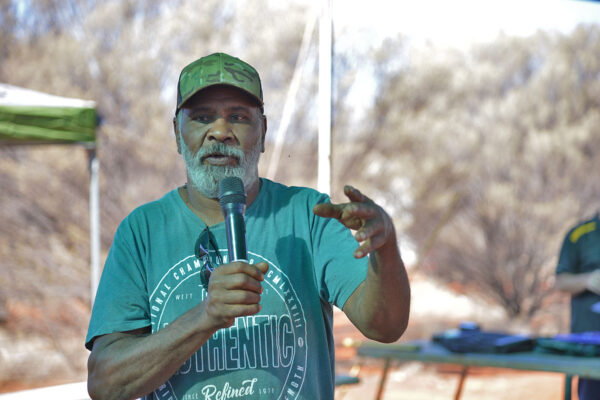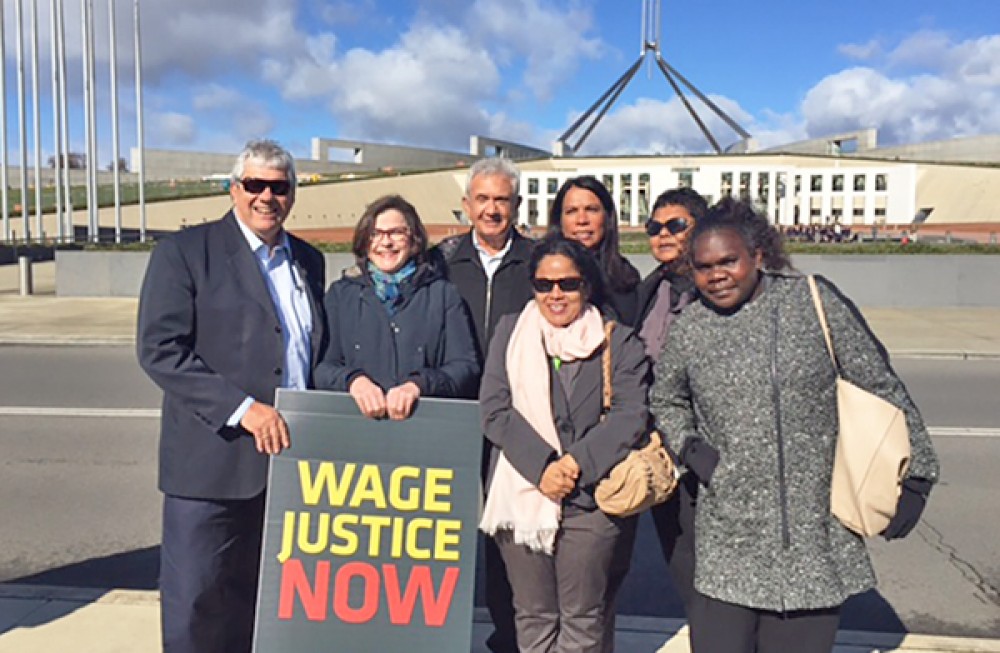Tag: Welfare
The Chair of the Central Land Council, Robert Hoosan, today welcomed the passage of legislation to abolish the cashless debit card (CDC) as an important step in the transition to end compulsory income management.
The cashless debit card will end in the Northern Territory next year, but a system of compulsory income quarantining will continue for at least a further 12 months after that.

“We at CLC strongly welcome abolishing the cashless debit card,” Mr Hoosan said. “On top of that, we want to see an end to all forms of compulsory quarantining of welfare money, but this has to be done carefully, making sure that people get good information and support so they understand the changes.
“The Government needs to consult properly with the community controlled Aboriginal organisations and with communities to co-design a new system with us so people can choose what is best for themselves.”
Mr Hoosan said this could allow for voluntary approaches to income management and should include investment in culturally appropriate financial counselling in languages people understand.
Compulsory income management was first introduced in the NT in 2007 as part of the Howard Government Northern Territory Intervention and was exclusively imposed on Aboriginal people. Mr Hoosan said that 15 years of income management had hurt Aboriginal people and caused a lot of harm.
“The Intervention and income quarantining really hurt Aboriginal people. It was racially-based and it stigmatised and shamed people. All the research done over the years has not produced any evidence to show that income management gave any benefit to solve social problems. It’s time to get rid of it.
“We want to see the money that has been spent on controlling people put into positive investments, and strategies that have good evidence to help people get treatment for alcohol and drug problems.
“And we want a new approach for remote employment and getting people off welfare and into local jobs that are good for communities, like the Aboriginal Peak Organisations NT proposal for a Remote Development and Employment Scheme to replace the failed CDP,” Mr Hoosan said. “That’s the future we want.”

Cashless Debit Card: Vote NO
The Central Land Council, as a member of the Aboriginal Peak Organisations NT (APO NT) alliance, has made an eleventh hour appeal to Senator Rex Patrick to vote against the Cashless Debit Card rollout in the Northern Territory. The bill, if passed in the Senate later today, will impose the scheme on 23,000 people in the Northern Territory – 82% of people whom are Aboriginal and living in very remote communities. The CLC’s opposition to the Cashless Debit Card is unequivocal and unchanged. The bill is discriminatory and will perpetuate compulsory income management in the NT without evidence or adequate review. It is a punitive hangover from the 2007 NT Intervention, which was and continues to be fiercely opposed by Aboriginal residents of the NT.
The CLC supports income management as a voluntary measure for those experiencing hardship who may value the structure it can provide during difficult times, or as a measure for individuals considered to be at high risk and vulnerable by Aboriginal controlled health organisations. What Aboriginal people want is a pathway out of poverty and into real training and employment, not an endless cycle of punitive government interventions that are not proven to be effective. Closing the Gap will only be achieved through positive programs and resources that assist people to improve their lives and emphasise Aboriginal and Torres Strait Islander self-determination.
We have urged Senator Patrick today to consider APO NT’s Remote Jobs Package that, if implemented, will go a long way to creating employment pathways in the NT – a more enduring, positive legacy than the one presented by the CDC expansion.
Inquiry into remote food security and pricing report
The Central Land Council welcomes the release of the final report of the House of Representatives inquiry into food security and pricing in remote Indigenous communities. The report is clear in its findings that Aboriginal people living remotely pay more for most types of goods than urban and regional Australians and suffer the consequences of significantly higher prices for fresh food and vegetables.
We are pleased that the Committee backs the CLC’s recommendation to establish a real-time price monitoring and point of sale data system across all remote community stores. To be effective, solutions to the remote food security crisis must be backed by reliable data to make price comparisons and empower consumers. We look forward to seeing greater transparency in store pricing and know this will help stores who are already working with communities and have strong pricing policies and community leadership.
We welcome the recommendation for an ACCC investigation to ensure adequate regulation of pricing moving forward. We urge the federal government to act quickly to implement the food inquiry report’s recommendations. This is the third report into remote food security issues in the past decade. And it is critically important that real change and improvement follows this most recent report to Aboriginal people closer to closing the gap on health outcomes.

Why we are calling on all MPs to oppose the Cashless Debit Card Expansion Bill
We call on all members of parliament to strongly oppose the bill that would expand compulsory income management in the Northern Territory through the Cashless Debit Card (CDC).
APO NT spokesperson John Paterson said, “Support for the bill would directly contradict the recent National Agreement on Closing the Gap that was supported by all levels of government including the Commonwealth. It is not in keeping with the spirit of the agreement and its emphasis on Aboriginal and Torres Strait Islander self-determination.”
Mr Paterson added, ”We did not ask for the card, yet 22 000 of us will be affected if the card is imposed on NT income recipients.”
There is still no proof that compulsory income management works. In February this year the University of Queensland released a report on their review of four CDC trial sites. The overwhelming finding was “that compulsory income management is having a disabling rather than enabling effect on the lives of many social security recipients.”
The Cashless Debit Card relies on regular and reliable access to the internet and mobile phone coverage. This is not the case for many remote communities in the NT. What works in other CDC trial sites will not work for the NT. 82% of people who will be transferred to the CDC are Aboriginal and most live on remote communities.
Mr Paterson said, “Face to face Centrelink support has been stripped back out bush and will be replaced by a 1800 number or an internet site. This is grossly inadequate for a population who lack digital literacy and where English is a second language”.
“The bill is a new Intervention. It will perpetuate the torment of our powerlessness. It denies our basic freedom to control our lives. It locks the many of us who live below the poverty line out of the cash economy and undermines our small businesses that rely on cash payments.”
“The millions of dollars supporting the transition of NT communities into a CDC “trial site”. would be better invested in holistic wrap around services helping our people to overcome drug and alcohol dependence and trauma. They and their families deserve support, not punishment.
“To the government this is just a law change, but to us it is about our everyday lives becoming even more of a struggle. We are sick of governments doing things to us, rather than with us.”
Mr Paterson concluded, “This bill disregards our views and lived experience and fundamentally undermines the collaborative spirit of the next phase of Closing the Gap. It symbolises why so many policies have failed our people and why things aren’t getting better in our communities.”
“We call on every MP to oppose this bill.”
The federal government must permanently and substantially raise the rate of income support payments and back community-led job creation proposals, a coalition of Aboriginal and human rights organisations says.
The Aboriginal Peak Organisations of the Northern Territory (APO NT), NT Council of Social Services (NTCOSS) and Human Rights Law Centre have joined hundreds of organisations and individuals around Australia in calling for a permanent increase in Jobseeker and other social security payments.
They have signed an open statement supporting today’s National Day of Action organised by the Australian Council of Social Services (ACOSS) at https://raisetherate.org.au/.
NT Aboriginal families, almost half of whom live below the poverty line, have been hit particularly hard by inadequate unemployment support and remote area allowance payments.
Aboriginal people make up just a third of the NT population, but represent 70 per cent of consumers of the NT health system.
They have been trapped in ill health and poverty not only by inadequate support payments, but the discriminatory and punitive work-for-the-dole scheme and compulsory income quarantining.
The government’s community development program has stifled job creation and financially penalised people forced to work for less than a fair wage.
At the same time the cost of food and other essentials in remote communities has been growing, with a basket of healthy food estimated to cost $319 more in a community store than in a Darwin supermarket.
The poorest Territorians are paying close to 60 per cent more for their groceries.
Quotes:
Deborah Di Natale (NTCOSS CEO): “I have seen first-hand the ridiculously high prices in remote communities and the lack of fresh fruit and vegetables on the shelves. This level of inequity should not be tolerated in a country that prides itself on a fair go.”
Joe Martin-Jard (Central Land Council CEO and APO NT representative):“The temporary coronavirus supplement has improved the health of Aboriginal people in remote communities, with stores reporting to CLC staff increased sales of fresh food, essential white goods and warm winter items, as well as a decrease in requests for emergency relief.”
Raising incomes for those who are unable to work or where few jobs exist is absolutely critical but must go hand in hand with a serious commitment to jobs creation in the bush.”
“For those who can and want to work we have a pathway into the world of properly paid employment – we just need the government to act on our remote job creation plan.”
Adrianne Walters (Associate Legal Director, Human Rights Law Centre):“We cannot go back to the indignity of people scraping to survive on $40 a day. The Government should permanently raise payments and end discrimination in the social security system to ensure every person has enough money to live a decent life.”
MEDIA CONTACT: Sasha Pavey | 0488 984 885| media@clc.org.au

The Central Land Council has asked the Prime Minister to suspend work-for-the-dole (also known as CDP) activities to prevent the spread of the coronavirus to remote Northern Territory communities before it is too late.
“We want CDP participants to be able to take care of their families and be free to contribute their own solutions to minimising the impacts of the pandemic,” CLC chief executive Joe Martin-Jard said.
“With government plans for the COVID-19 response in remote communities only just taking shape our constituents need to be able to participate fully in the planning required to overcome what will be huge logistical and practical challenges.”
He said communities and individuals needed maximum flexibility in deciding how to respond to a very dynamic and disruptive situation.
“Some are retreating to even more remote outstations and homelands to isolate the elderly and the chronically ill and need to be able to stock up on food and medical supplies without worrying about penalties and loss of income.”
Exemptions on a case-by-case basis will not work.
Health services will be stretched to the limit and should not be burdened with having to issue medical certificates for individual CDP participants.
“The sensible and responsible thing to do is to cancel all participation requirements for the duration of the pandemic and allow our people to put their health and safety first,” said Mr Martin-Jard.
The CLC has also suspended all travel by exploration companies and cancelled tourist permits to protect vulnerable community residents from the spread of the coronavirus.
“We are contacting exploration companies and tour groups to tell them that their entry permits have been revoked as a public health measure,” he said.
“We are asking everyone to put the needs of the most vulnerable first by staying away from remote communities and have instructed our town-based staff to do the same.”
“Almost 20 tourist groups with valid transit permits for Aboriginal land are being contacted and offered a refund of permit fees,” he said.
“We are also notifying seven exploration companies that we are cancelling the entry permits of their staff and contractors until further notice.”
The CLC’s Aboriginal Associations Management Centre also cancelled all Aboriginal corporation meetings scheduled between now and mid-April in order to encourage members to stay in their home communities.

Aboriginal organisations in the Northern Territory have expressed deep concerns that the Federal Government plans to rush through a bill to impose a new form of compulsory income management in the NT despite months of advocacy from Aboriginal Peak Organisation NT (APONT) on the need for greater discussion and consultation on the ground.
“The bill would significantly alter the controversial income management that is already in place in the Northern Territory and put it in place indefinitely, yet communities are largely unaware of the proposed changes. Parliament must refer the bill to a Senate inquiry at the very least,” Aboriginal Medical Services Alliance NT (AMSANT) CEO John Paterson said.
“This feels like the Howard era Intervention all over again. The last time the government intervened in the NT, and did things to us instead of with us, it failed at great cost to families and communities,” Mr Paterson said.
“This directly opposes recent commitments by the Federal Government and COAG to work with us in partnership on Closing the Gap. Aboriginal people in the NT will be most affected by this new form of top-down control and deserve the chance to give evidence. Without due consideration this proposal makes a mockery of government rhetoric around Aboriginal controlled decision making,” he said.
The Director of the Arnhem Land Progress Association (ALPA), Keith Lapulung, said “This legislation will be dropped into our communities from outside with no consultation and no understanding. It will take away peoples’ choice and control, their rights and self-determination.”
“It will add to the negative effects of the Intervention in our communities, not only taking away peoples control over their lives but by making it harder for small Indigenous businesses who may not be able to accept the card to survive,” Mr Lapulung said.
“We don’t want this to come to our communities and take away peoples’ dreams of running their own small business,” Micky Wunungmurra, ALPA’s deputy chair and the Traditional Credit Union’s chair added.
The Australian National Audit Office has described the Cashless Debit Card evaluation the Federal Government keeps quoting as “inadequate”. The card has also been criticised by the parliament’s expert committee on human rights and a robust evaluation of four years of compulsory income management in the NT was equally damning.
Contact: John Paterson (CEO AMSANT): 0418 904 727 | Liam Flanagan: Manager Community Services ALPA: 0417 355 036

Who: John Paterson, CEO, Aboriginal Medical Services Alliance NT (APO NT), David Ross, Director, Central Land Council (APO NT), Rod Little, Co-Chair, National Congress, David Thompson, CEO, Jobs Australia, Ged Kearney, President, Australian Council of Trade Unions, Maria Harvey, CEO, Tiwi Islands Training & Employment Board, Dickie Bedford, CEO
The Australian Government should replace its racially discriminatory remote ‘work for the dole’ program with an Aboriginal-led model for fair work and strong communities.
In a report to be launched in Canberra, the Aboriginal Peak Organisations NT (APO NT) will call for the Government to afford people in remote communities with respect, opportunity and the same workplace rights that other Australians take for granted.
John Paterson from APO NT, said, “For too long the Australian Government has not listened. Aboriginal and Torres Strait Islander people in remote communities want to take up the reins and drive job creation and community development initiatives. It’s time for the Government to work with us.”
“The current Community Development Program keeps people in the welfare system and excessive penalties are devastating remote communities. Remote communities need a program that sees people employed on decent pay and conditions, to work on projects the community needs,” said Mr Paterson.
The report calls for a new model – the Remote Development and Employment Scheme. The Scheme would create 10,500 part time jobs to be filled by people who are currently receiving below minimum wage social security payments to do work they should be employed to do.
David Ross from APO NT, said, “The new model will see new opportunities for jobs, enterprise and community development and get rid of pointless administration. Critically, the Scheme provides incentives to encourage people into work, training and other activities, rather than punishing people already struggling to comply.”
The Remote Development and Employment Scheme would support young people with paid traineeships. Remote Job Centres would guide people into meaningful jobs, and work with communities to build opportunities for enterprise and long term jobs. People who still require the support of the social security system would have obligations no more onerous than those that apply to people in non-remote areas.
APO NT’s new model has been supported by over 30 organisations, including remote community Aboriginal-controlled service providers.
Further quotes about the report:
Dickie Bedford, CEO, Marra Worra Worra: “Under the CDP communities have lost control, and people feel that it is just the Government telling them what to do. The APO NT model would allow us to employ our own people, with rules that are set to meet our conditions and the aspirations of our communities.”
Maria Harvey, CEO, Tiwi Islands Training and Education Board: “Under CDP, instead of working to get people skilled up to get better jobs, we spend our time on administration so that people can be penalised by Centrelink. A lot of work for the dole projects in remote constitute duties that other people are paid wages for in any other part of the country. The APO NT Model will give a platform for this real job creation to occur. Under the APO NT model our focus would go back to working with the community and individuals to get more people into employment.”
Rod Little, Co-Chair of the National Congress of Australia’s First Peoples: “Congress is encouraged that this model has been developed by people and organisations working on the ground with job seekers.
It aims to ensure success with Aboriginal and Torres Strait Islander people clearly directing the program based on evidence and learning, and focused on achieving long-term results.
We urge the Government to support this program to enhance skills and community capacity building, and eliminate harm caused by unemployment and poverty.”
Ged Kearney, President of the Australian Council of Trade Unions: “The CDP is a racially discriminatory program which is having a devastating impact on jobs in remote communities. Workers in remote communities need jobs which are paid a wage, not unpaid positions in a punitive program which overwhelmingly applies to Indigenous Australians.
The ACTU, through the FNWA, stands with workers in remote communities for the duration of this campaign. We want to see this program scrapped, we want to change the rules for workers in remote communities. We cannot tolerate one rule for people in the cities and another for First Nations workers.”
David Thompson AM, CEO of Jobs Australia: “The Community Development Programme is causing unnecessary financial hardship, exacerbating poverty and doing more harm than good in remote Australia. It has not made significant inroads in providing long-term solutions to joblessness. Indigenous people in CDP are much more likely to get a financial penalty than get a job.”
Adrianne Walters, Director of Legal Advocacy at the Human Rights Law Centre: “The Government’s Community Development Program requires people in remote communities to work up to 500 or 760 hours more over a year than people in non-remote areas without any extra payment. It is a program applied overwhelmingly against Aboriginal and Torres Strait Islander people. This is a racially discriminatory government program that is displacing waged work and must be abandoned.”
Cassandra Goldie, CEO of the Australian Council of Social Service: “The Government must work with Aboriginal people and repair the safety net for remote communities. We have heard story after story of people being penalised, unable to access Centrelink, and ending up without any income support. It is the Government is failing in its duty to ensure that basic social protections are available to those who need them.”
The launch coincides with Senate hearings about the Government’s current Community Development Program, work for the dole program.
A summary of APO NT’s Report can be found here.
Media contact:
John Paterson, APO NT: 0418 486 310
David Ross, APO NT: 0417 899 950
Rod Little, National Congress: 0419 146 871
David Thompson, Jobs Australia: 0419 527 753
Cassandra Goldie: 0419 626 155
Ged Kearney, ACTU: 0400 764 200
Maria Harvey, TITEB: 0439 373 383
Dickie Bedford, Marra Worra Worra: 0458 019 672
Michelle Bennett, HRLC: 0419 100 519
